#Miyazaki Maya
Text
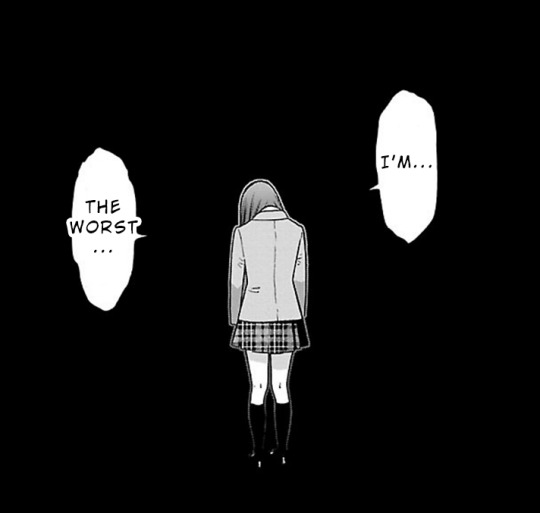
224 notes
·
View notes
Text
Ideas for future episodes of “Epic Rap Battles of History”:
1) Emily Dickinson vs. Maya Angelou (theme: two of the greatest female poets)
2) Ho Chi Minh vs. Charles de Gaulle (theme: two leaders of independence movements)
3) Akira Kurosawa vs. Hayao Miyazaki (theme: two Japanese directors who changed cinema)
4) Audie Murphy vs. Steve Rogers aka Captain America (theme: real-life American WWII hero against a fictional one)
5) Hattori Hanzo vs. Naruto Uzumaki (theme: real-life ninja against a fictional one)
6) Audrey Hepburn vs. Katharine Hepburn (theme: battle of the world-famous actresses who share the same surname)
7) Fictional Lawyer Battle Royale (Atticus Finch vs. Perry Mason vs. Saul Goodman vs. Matt Murdock/Daredevil vs. Phoenix Wright)
#epic rap battles of history#erb#youtube#emily dickinson#maya angelou#ho chi minh#charles de gaulle#akira kurosawa#hayao miyazaki#audie murphy#steve rogers#hattori hanzo#naruto uzumaki#audrey hepburn#katharine hepburn#atticus finch#perry mason#saul goodman#matt murdock#phoenix wright#rap battle
52 notes
·
View notes
Text
⠀⠀🌺⠀ 𝒇𝒊𝒍𝒆𝒅 𝒂𝒔: character tags!⠀
#˳⁺⁎˚⠀𝒄𝒉𝒂𝒓𝒂𝒄𝒕𝒆𝒓⠀🌺⠀margareth mae‚ maggie.⠀˚⁎⁺˳#˳⁺⁎˚⠀𝒄𝒉𝒂𝒓𝒂𝒄𝒕𝒆𝒓⠀🌺⠀mary macdonald.⠀˚⁎⁺˳#˳⁺⁎˚⠀𝒄𝒉𝒂𝒓𝒂𝒄𝒕𝒆𝒓⠀🌺⠀maya han.⠀˚⁎⁺˳#˳⁺⁎˚⠀𝒄𝒉𝒂𝒓𝒂𝒄𝒕𝒆𝒓⠀🌺⠀matthew gun seward‚ minsoo.⠀˚⁎⁺˳#˳⁺⁎˚⠀𝒄𝒉𝒂𝒓𝒂𝒄𝒕𝒆𝒓⠀🌺⠀maurício caetano cobreloa choi‚ cobra.⠀˚⁎⁺˳#˳⁺⁎˚⠀𝒄𝒉𝒂𝒓𝒂𝒄𝒕𝒆𝒓⠀🌺⠀min heeyeon‚ helena.⠀˚⁎⁺˳#˳⁺⁎˚⠀𝒄𝒉𝒂𝒓𝒂𝒄𝒕𝒆𝒓⠀🌺⠀michale hong simons‚ graves.⠀˚⁎⁺˳#˳⁺⁎˚⠀𝒄𝒉𝒂𝒓𝒂𝒄𝒕𝒆𝒓⠀🌺⠀michelle hwang‚ misu.⠀˚⁎⁺˳#˳⁺⁎˚⠀𝒄𝒉𝒂𝒓𝒂𝒄𝒕𝒆𝒓⠀🌺⠀miguel cristiano moreira gwon.⠀˚⁎⁺˳#˳⁺⁎˚⠀𝒄𝒉𝒂𝒓𝒂𝒄𝒕𝒆𝒓⠀🌺⠀miriam dulcie mansnoozie.⠀˚⁎⁺˳#˳⁺⁎˚⠀𝒄𝒉𝒂𝒓𝒂𝒄𝒕𝒆𝒓⠀🌺⠀miyazaki risa.⠀˚⁎⁺˳#˳⁺⁎˚⠀𝒄𝒉𝒂𝒓𝒂𝒄𝒕𝒆𝒓⠀🌺⠀myeong jeni‚ jenny.⠀˚⁎⁺˳#˳⁺⁎˚⠀𝒄𝒉𝒂𝒓𝒂𝒄𝒕𝒆𝒓⠀🌺⠀nicholas chung van der bilt‚ nico.⠀˚⁎⁺˳#˳⁺⁎˚⠀𝒄𝒉𝒂𝒓𝒂𝒄𝒕𝒆𝒓⠀🌺⠀ophelia harris lee.⠀˚⁎⁺˳#˳⁺⁎˚⠀𝒄𝒉𝒂𝒓𝒂𝒄𝒕𝒆𝒓⠀🌺⠀orlando beom.⠀˚⁎⁺˳#tags
0 notes
Photo

Celebrities
Taika Waititi went up +69 this year. Nice.
Queen Elizabeth II
Joseph Quinn
Andrew Garfield
Tom Holland +3
Chris Evans -3
Taika Waititi +69
Oscar Isaac +32
Robert Pattinson +44
Misha Collins -5
Tobey Maguire
Joe Keery
Zendaya +7
Sebastian Stan -10
Jensen Ackles -9
Elon Musk +22
Pedro Pascal -15
Chris Pine
Rhys Darby
Neil Gaiman
Henry Cavill -12
Florence Pugh +20
Maya Hawke
Chris Pratt +12
Will Smith
Alex Hirsch +55
Johnny Depp +24
Kit Connor
Mads Mikkelsen -10
Ewan McGregor +28
Tom Hiddleston -24
Sadie Sink
Hayden Christensen
Dana Terrace
Hailee Steinfeld +29
Timothee Chalamet -11
Joey Batey +59
Matt Smith
Tom Sturridge
Dylan O’Brien +8
Katie McGrath -25
Joe Locke
Finn Wolfhard
Alfred Molina
Keanu Reeves -8
Noah Schnapp
Benedict Cumberbatch -4
Zoë Kravitz
Hugh Dancy -22
David Tennant -21
Elizabeth Olsen -33
Hayao Miyazaki +10
Natalia Dyer
Apo Nattawin
Charlie Cox
Tom Hardy -24
Paul Dano
Jamie Campbell Bower
Mile Phakphum
Jodie Whittaker
Sydney Sweeney
Chris Rock
Chris Hemsworth -22
Alexa Demie
Ryan Reynolds
Nichelle Nichols
Marilyn Monroe -17
Amber Heard
Barry Keoghan
Natalie Portman
Harvey Guillén
Selena Gomez
David Jenkins
Con O’Neill
Christopher Eccleston
Tessa Thompson +15
Simone Ashley
Jonathan Bailey
Jodie Comer +7
Walker Scobell
Bella Hadid -22
Wang Yibo -54
Betty White
Scarlett Johansson -58
Anne Hathaway
Emma Watson -9
Millie Bobby Brown
Jared Padalecki -76
Ana De Armas +3
Xiao Zhan -60
Oliver Stark -23
Bible Wichapas
Prince William
Angelina Jolie
Toby Fox
Jack Black
John Mulaney -84
Michael Sheen -42
Blake Lively
Ryan Guzman
Anya Taylor-Joy -68
The number in italics indicates how many spots a name moved up or down from the previous year. Bolded names weren’t on the list last year.
3K notes
·
View notes
Text
Evangelion: You Can (Not) Marathon — (Part 11)
Neon Genesis Evangelion, “Episode 11: In the Still Darkness/The Day Tokyo-3 Stood Still”
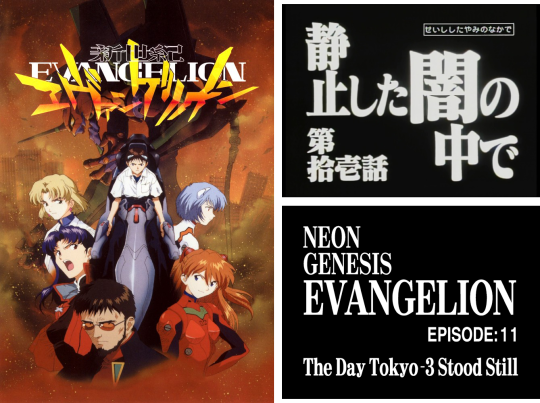
Continuing my Evangelion re-watch marathon with NGE, “Episode 11: In the Still Darkness/The Day Tokyo-3 Stood Still”! For my thoughts on the previous episode, click the link to the post below:
So here’s some very interesting trivia about Episode 11! The animation for this episode was actually produced primarily by Studio Ghibli instead of Gainax. I couldn’t find much information about why exactly Studio Ghibli were guest animators for this episode specifically, but if I had to haphazard a guess I’d say it was probably due to a combination of both Studio Gainax’s rapidly declining financial resources during the early & mid-1990s which heavily impacted NGE’s budget and production going forward, as well as the fact that Studio Ghibli’s founder, the famed Hayao Miyazaki, was a former mentor for and is good friends with NGE’s director Hideaki Anno. And Ghibli’s fingerprints are definitely visible in this episode as not only does the art style in the animation stand out as a bit more wonky and overly expressive than in previous episodes of the series due to differences in animation director Toshio Kawagushi’s graphic rendering style, but Episode 11 includes multiple humorous gags that wouldn’t feel out of place in a Ghibli movie!
The booklets for the original Platinum Collection DVD boxset provide some further in trivia regarding Studio Ghibli’s involvement in the predation of this episode, including some background Easter-Eggs: “The animation for this episode was handled by Studio Ghibli, known for their work on such films as ‘My Neighbor Totoro.’, Nozomu (written as ‘peek’) Takahashi, the city assembly electoral candidate, who only appears as a name is a twist on the producer of Ghibli, Nozomu (written as ‘aspire’)” Takahashi. [Blooper here, since the name of the guy in the episode is pronounced ‘Nozoku’.]”
Similarly, the Oguru Commentary #44 elaborates: “Studio Ghibli is in charge of the original drawings. Takahashi Nozomi, a city council candidate who appears in the play, is named after Ghibli producer Nozomu Takahashi at the time. Mr. Takahashi used to be an editor of Animage, and Dr. He was in charge of the serialized article "Video Lab" under the name Nozomu. Some readers may remember him. Although it has nothing to do with Ghibli, the poet Hideaki Antani appears in the "My Resume" section of the newspaper Fuyutsuki was reading.”
But with all of that out of the way, let's finally dig into the episode itself!
Lol! I love how the episode opens with Aoba getting a UCC Coffee can out of a vending machine at his local laundry mat! I guess the first two Rebuild movies weren’t the only times Evangelion plugged that particular bit of product placement!
So this introductory scene of Ritsuko, Maya & Aoba at the laundry mat before meeting Professor Fuyutsuki on the subway is incredibly intriguing on multiple levels. Similar to the previous scene from Episode 10 showing the NERV Staff relaxing during a non-chaotic situation, this allows us to get a further glimpse into the daily lives of NERV’s personnel outside of their usual military industrial setting. It makes these characters feel a lot more human and three-dimensional in that regard. It’s also interesting to see how while Ritsuko is very casual in her interactions with Fuyutsuki, Maya & Aoba still address him as their commanding officer even when off-duty.
But even more importantly, the subway scene further fleshes out the world-building of Tokyo-3 as a fictional setting, as Anno reveals some rather interesting details about the city’s political structures and institutions. Specifically, Fuyutsuki & Ritsuko reveal to Maya & Aoba that the city’s official council are largely just figureheads despite politicians still holding elected positions of power, and that in actuality the majority of the Tokyo-3’s decision-making process is relegated to the Magi supercomputer system down in NERV HQ’s Central Dogma. While Maya makes an off handed remark about this system still being “democratic,” I can’t help but find the idea of restricting policy-making to three sentient AI programs to be rather authoritarian and undemocratic in actuality. Like, the idea is that humans are inherently distrustful and incapable of being trusted with making important political decisions is not only an incredibly nihilistic perspective, but you are still restricting power to three “superior” authorities rather than giving power to the people themselves.
It’s honestly a rather fascistic system of government when you stop and think about it, and I can’t help but view it as an intentional choice on Anno’s part given that EVA takes a lot of inspiration from the themes of Ryu Murakami’s novel Fascism of Love and Illusion, which according to the EVA Geeks Wiki, focuses on “the ‘activities’ of the ‘Hunting Company,’ a political association that thoroughly rejects the weak and weak democracy and aims to establish a dictatorial and fascist society. The story is set in Japan, which is in the midst of a crisis of global depression and a sense of extreme stagnation, and the political organization ‘Hunting Company’ engages in both open and closed conspiracy, violence, and terrorism.”
In that regard, there are actually quite a few parallels between Murakami’s “Hunting Company” and both NERV and its parent organization SEELE in EVA, the latter two of which are depicted in increasingly negative and vilified lights as the series progresses.
Even Aoba somewhat addresses my concerns about the authoritarian nature of a supercomputer administrated government by not only dismissing Ritsuko, Maya & Fuyutsuki as “technophiles!” Furthermore, his his comment also correlates with the second episode’s title “The Day Tokyo-3 Stood Still” being an overt reference to the classic sci-fi film The Day the Earth Stood Still, since both stories explore the implications of humanity’s relationship with and over-reliance on technology.
Again, I can’t help but wonder if this was also meant to serve as some kind of critique against fascistic authoritarianism in-relation, only in this case through placing total authority onto science & technology instead of a traditional human dictator?

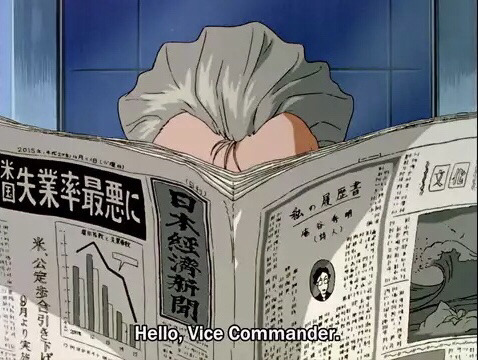

Lol! I love the expressionless look on Misato’s face as she casually tries to shut the elevator doors as soon as she see’s Kaji rushing towards the doors, only for her facial expressions to immediately shift to cartoonish annoyance as soon as Kaji stops the doors from closing and gets inside with her!
Sigh… poor Shinji… I can’t help but feel incredibly bad for him here as Gendo coldly and rudely dismisses his own son when he tries to call about parental approval for a vocational education form, demanding that Shinji never call him on that phone line ever again. Have I mentioned before how much I absolutely despise Gendo’s guts?
Also, I don’t think I’ve given Spike Spencer’s voice acting as Shinji enough credit during this marathon. While Spencer’s delivery does start off pretty rough in places during the first few episodes of the series, you can really see him grow more naturally accustomed to the role as the show progresses. Spencer conveys Shinji’s feelings of anxiety, confusion, and rejection during this pay phone interaction so well!

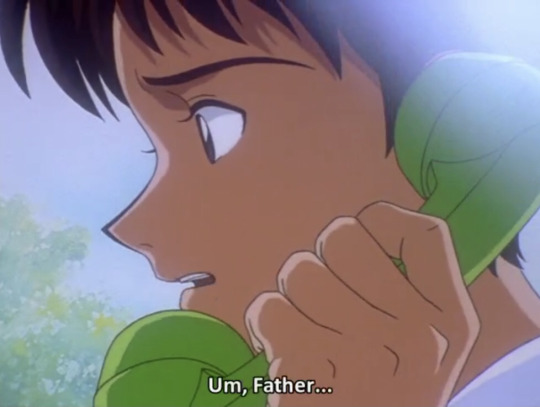
Oh boy! It’s during this scene where Shinji’s being scolded on the phone by Gendo that crap truly starts to go down in this episode! Not only does Shinji randomly lose his father’s signal during their call all of a sudden, but at the exact same moment the power completely goes out in NERV HQ, trapping Misato & Kaji in the elevator in the process! Even all of the emergency back-up generators have completely shut down, therefore rendering NERV and all of Tokyo-3 completely without electricity. Additionally, Fuyutsuki orders that all little remaining power be completely redirected towards operating the Magi, even if it means completely cutting off NERV’s life-support systems (again, reinforcing the inherent authoritarianism behind relegating all political power to 3 supercomputers).
Like dang! This entire scenario of NERV and the city of Tokyo-3 experiencing a mass blackout not only makes for an incredibly entertaining premise for the episode, but from a thematic perspective it effectively conveys why putting all of our faith and trust in technology to administer our lives and daily routines has its serious drawbacks and risks!
Wait, why does the street have “EVA Socket” written across the left lane in big orange letters? That seems like a random detail…
Asuka continues to demonstrate a similar type of toxic patriarchal attitude that I previously discussed with Misato back in Episode 4, wherein she mocks Shinji for “not acting like a man [and] letting everything get under his skin.” Not only is this reflective of how attitudes of toxic masculinity and patriarchy so systemically interwoven into societal institutions that they can influence of women to uphold said traditionalist perspectives and not just men, but it also highlights a particular characteristic of Asuka’s character specifically. Namely, “masculine protest,” which according the Wikipedia article for this episode, is “a psychological term for a form of rebellion identifiable in women who are tired of the role stereotypically associated with the female gender. [In this regard] Asuka acts as if she is trying to prove herself and surpass the male gender, fusing an inferiority complex and radical rivalry.”
Not only does masculine protest inform Asuka’s egotism and competitive behavior with Shinji during the previous three episodes she’s appeared in so far, but it’s particularly on display here in Episode 11 as the trio of pilots are forced to infiltrate navigate NERV’s maze-like network of during the middle of the blackout.
Asuka’s “masculine protest” also serves as an interesting contrast to Shinji’s behavior being more feminine coded at times, highlighting how her rivalry with Shinji is largely artificial, a byproduct of not only her own deep-seated psychological trauma, but also her unwittingly playing into toxic societal expectations and gender stereotypes despite actively trying to rebel against them. In essence, Asuka wants to prove her own “superiority” to Shinji, but at the same time she tries to force expectations of toxic masculinity onto him in order to inflate said-competition! This also ties into the episode’s underlying themes regarding the fallacies of authoritarianism, since Asuka repeatedly tries to reinforce her own singular authority upon her fellow EVA pilots whom she perceives as being inferior to herself, only for the majority of said-efforts to be undermined by her peers, thereby demonstrating just how inefficient authoritarianism actually is.
And to cap off this scene, I love the subtle look Rei gives as Asuka is emasculating Shinji. As if to indicate that she’s beginning to question pre-programmed societal and gender expectations? That wouldn’t surprise me considering that Rei’s overall character arc is all about gradually questioning and later defying Gendo’s abusive gaslighting and expectations in order to achieve independence by discovering her own individual sense of self. In a sense, while Rei was designed as a cog in NERV’s authoritarian machine in order to fulfill Gendo’s patriarchal ambitions to resurrect his wife Yui Ikari (due to Rei’s nature as a clone of Yui artificially created in a lab), she’s beginning to question the expectations and norms imposed upon her since birth!
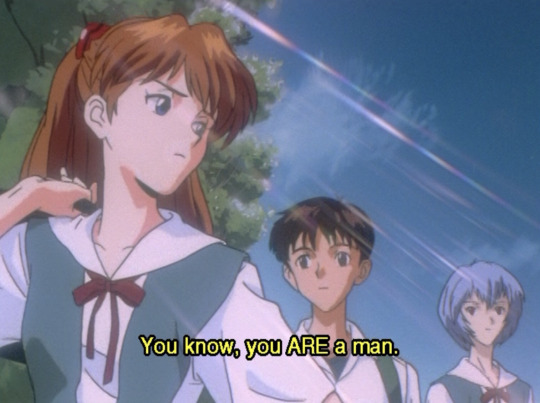
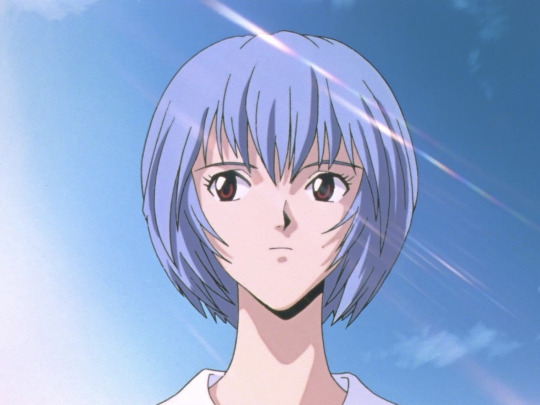
So this episode actually introduces one of several unanswered mysteries which EVA fans have continued to speculate & debate about in the decades since the series’ release: who exactly was responsible for the blackout in Tokyo-3?
Misato & Gendo both come to the realization that the blackout must be a deliberate act of sabotage since they state that it’s impossible for all three of the generators which supply NERV HQ and the city above with electricity to simultaneously shut down. Despite the episode raising the question of who exactly cut the power, the culprit’s identity is never confirmed either here or later on the series. While some fans have speculated that it was either a random terrorist, or agents of SEELE who caused the blackout, I’ve personally also believed to Kaji be a likely suspect due to him being a double/triple agent for both NERV and SEELE who’s true allegiances are similarly left incredibly vague!
If Kaji is indeed the culprit, then him rushing to get on the elevator only for them to get conveniently stuck inside during the blackout definitely wasn’t just an excuse to continue making flirtatious advances towards Misato then!
Lol! The dramatic irony here! Just as soon as Fuyutsuki states that he hopes an Angel doesn’t show up to attack Tokyo-3 during the blackout when NERV is defenseless, the scene immediately cuts to the JSSFD detecting the Ninth Angel, Matarael, slowly approaching Tokyo-3 on radar!
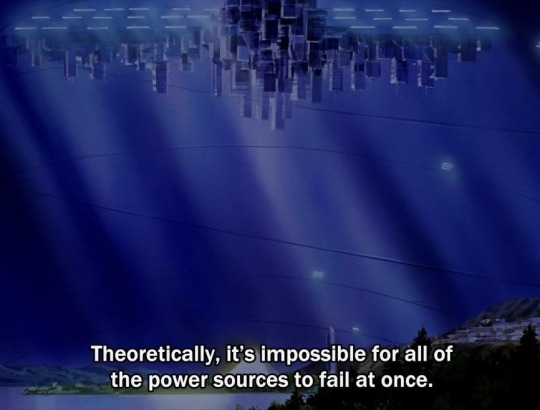
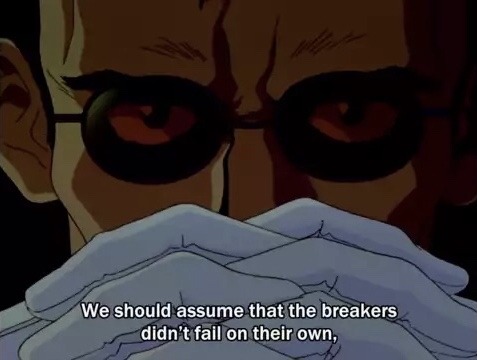
All that’s missing here is the “wa wa wa” trombone sound-effect!
I love the brief montage of Misato, Aoba, and Rei each realizing that the emergency phone lines are down as well! Great editing on Gainax & Ghibli’s part there!
Asuka immediately taking on the self-assigned role of “group leader” the moment she, Rei & Shinji realize that they need to break into NERV HQ themselves in order to assess whether or not anybody inside is in danger. While this is definitely both funny and perfectly in-character for her, it’s also further reflective of her inflated sense of pride and competitive streak while also correlating with her artificiality of her “masculine protest.”
Not only does Asuka bring up the idea of a group leader when it wasn’t even suggested by Shinji or Rei, but she quickly assigns said-role to herself while asking if the two have “any objections?”, in essence forcing them to go along with her games that are designed to validate her own pride. It really does demonstrate how despite Asuka’s constant attempts to frame herself as a “mature grown-up” in the eyes of both her peers and commanding officers, in reality she is acting incredibly childish and immature by doing so. Brilliant screenwriting and characterization on Anno’s part!
Lol! And Rei immediately partially exposes in the inherent childishness of Asuka’s “masculine protest” by pointing out that the emergency entrance to NERV HQ is behind Asuka just as she boasts about leading the way ahead of Rei & Shinji!
Yup… more toxic reinforcement of gender stereotypes on Asuka’s part. She immediately defers to Shinji manually opening the door, essentially ordering him to do all of the heavy-lifting despite her desire to prove her “superiority” simply because she thinks heavy-lifting is “man’s work.”
Interestingly, this scene of Shinji doing the “heavy-lifting” for Asuka is juxtaposed against Hyuga delivering Misato’s laundry for her just as soon as he hears a JSSFD plane overhead warning about the approaching Angel. It seems that while Misato has at least somewhat worked through her previous attitudes concerning toxic patriarchal expectations of men when it comes to Shinji, she’s still actively engaging in such attitudes when it comes to having her subordinate Hyuga basically act as her secretary…
Lol! The Studio Ghibli animation is definitely noticeable in this scene where Kaji suggests that Misato “take off her shirt” when she’s dying of sweat in the elevator…
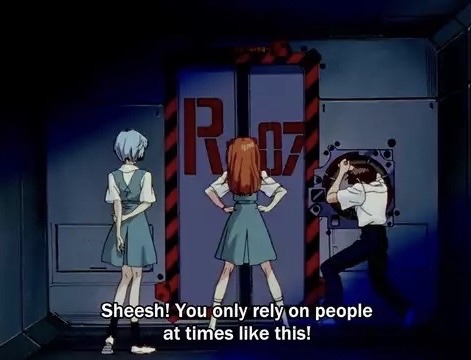
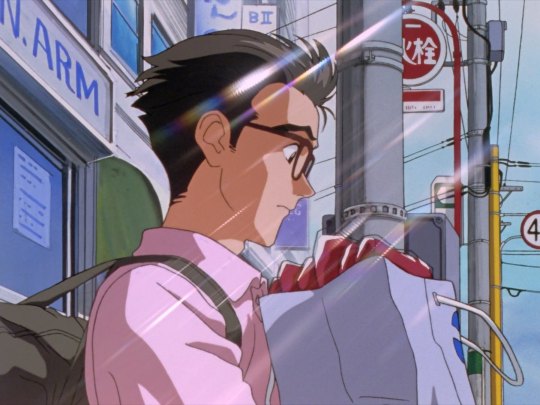
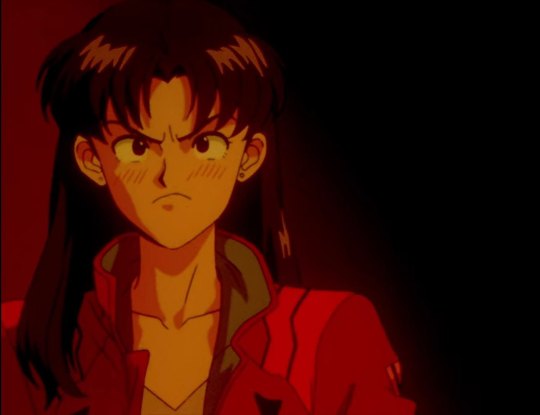
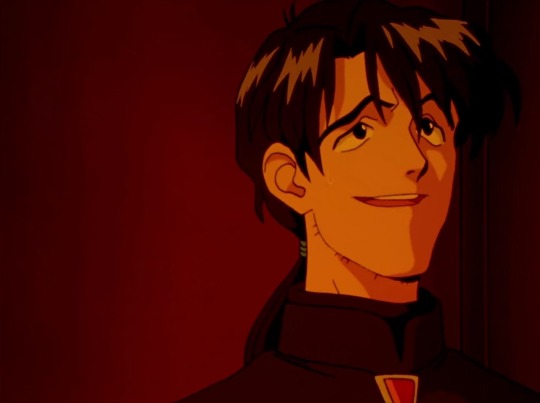
No joke, when I first saw this scene several years ago of Maya telling Ritsuko that the commanders were “still cool and in control” despite the growing heat and lack of air conditioning, only for it to then cut to Fuyutsuki’s bare feet in a bucket of water behind the desk and to have him tell Gendo, “It’s hot…,” I immediately burst out laughing!
I think it was the combination of the contrast of Maya’s impression of Fuyutski’s professionalism against the silly image of his bare feet in water, as well as VA Guil Lunde’s dry delivery of Fuyutsuki’s line that made me laugh so hard! Haters like to say that EVA is nothing but depressing psychoanalysis, but scenes like this prove that EVA can actually be incredibly funny whenever it wants to be!

Another funny moment! Hyuga basically just carjacked a news van in order to not only warn people about the rapidly approaching Angel, but also to break through the barricades to NERV HQ! Feel sorry for the poor news anchors he dragged into this though…
Fuyutski & Ritsuko’s theory about someone deliberately sabatoging NERV’s power systems in order to get a complete read-out of the headquarters and the system’s layouts definitely provides credence to the fan theory that this was all part of SEELE’s plans to later launch an all out invasion during The End of Evangelion, especially since Episode 7 previously established that NERV was also facing severe budget cuts for their defense program! Anno is very efficient in subtly foreshadowing and planting the seeds for future payoffs incredibly early on! Kudos!
Also, Gendo’s line about “mankind’s greatest enemy [being] man himself” after Fuyutsuki expresses frustration about the first being to truly infiltrate NERV HQ being “a member of [their] own species.” This highlights how despite the looming apocalyptic threat that the Angels represent to humanity, at the end of the day the principle antagonist of the Evangelion franchise is ultimately humanity itself! A sentiment which will later be reflected by Misato & Hyuga during a similar exchange in The End of Evangelion!
Lol! Looking at this image of Asuka, Shinji & Rei marching single file through NERV’s dark tunnels, combined with Asuka’s own childish games of “leadership,” I can’t help but think that Asuka would fit in perfectly with John, Michael and the Lost Boys of Neverland from Disney’s Peter Pan!
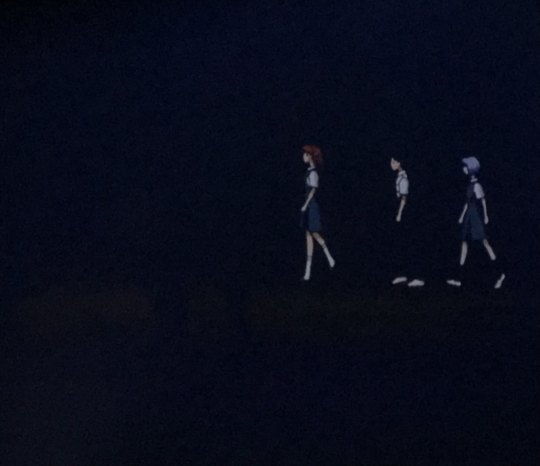
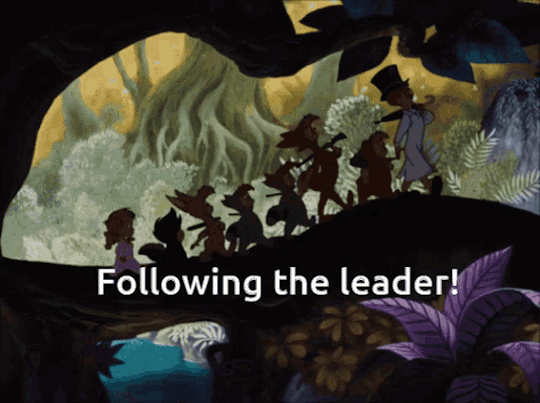
Actually… considering that John and the Lost Boys were similarly playing in childish games of “hunting Indians” (yeah… some casual 1950s colonialist racism on Disney’s part there… classy…) while including anti-Indigenous slurs in their “Following the Leader” song, while also dismissing Peter and Wendy visiting the Neverland’s mermaids as “girls stuff” in a misogynistic manner, the Peter Pan reference is actually more apt than I originally thought considering that those are similar authoritarian & gender-essentialist societal “norms” that this episode is criticizing Asuka for actively engaging in...
As funny as it is to see Asuka immediately defer to Rei leading them to the shortcut after the overhear Hyuga overhead warning about the Angel despite still proclaiming to be the leader, it does feel a bit out of character for Asuka considering how much she hates Rei especially for reminding her about the parts about her past that she hates about herself. Or is this Anno deliberately conveying subconscious cracks in Asuka’s armor?
Oh boy, Shinji finally asked one of the biggest questions a lot of fans were probably having by this point in the series (myself included when I first watched it): “What exactly are the Angels and why are they attacking us? Aren’t they supposed to be messengers from God?”
And of course Asuka does little to answer his questions by shutting him down with her, “What are you, stupid?”, catchphrase before giving him the reductive answer of, “Who cares? They attacked us first? And when someone’s attacking you, you attack back.”
It’s definitely reflective of Asuka’s narrow-minded and immature mindset…
Holy crap! The scene where the trio makes a wrong turn (once again due to Asuka’s childish egotism), only for her to open a door back to the surface with the 9th Angel, Matarael, lurching across the city and stopping to stare directly back at her, leading to Asuka to quickly shut the door in an understandable panic, is still legitimately terrifying and chilling! The soundtrack “Angel Attack III” certainly helps emphasize the fear in tension on display here!
Returning to Matarael specifically though, I do quite dig this Angel’s design here. Not only does Matarael have this unique arachnid-like aesthetic, with its giant lumbering legs making it strongly resemble a daddy long-legs spider (which make the Angel’s movements feel simultaneously slow yet menacing) but also the multiple Illuminati-pyramid eyes that are spread out all across its body! While some fans have obviously connected the pyramid eyes to SEELE considering the organization’s similarities to Illuminati conspiracy theories, I can’t help but be reminded of Bill Cipher from Gravity Falls every time I now look at Matarael’s eyes!
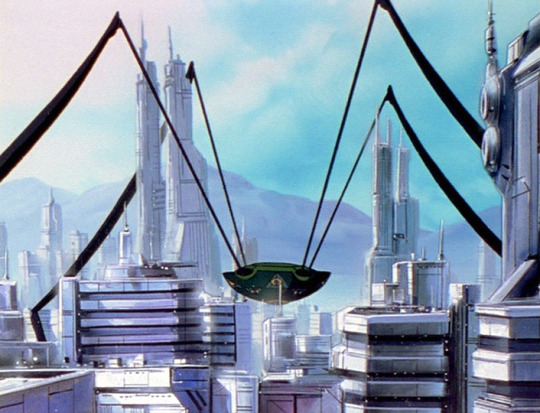
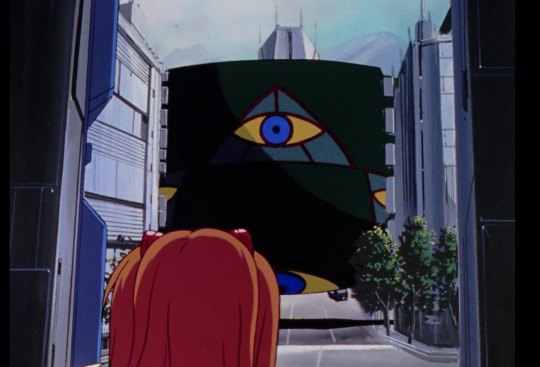

Are we sure Matarael is actually an Angel and not just a relative of Bill Cipher’s from the Weirdmaggedon dimension? It’s certainly possible considering that not only is inter-dimensional travel a firmly established precedent in Gravity Falls, but the series finale of that show also references a lot of visual imagery from EVA!
Being serious again though, in regards to this Angel’s name, Wikipedia states that, “The name Matarael (Hebrew: מטראל) also comes from the Book of Enoch, where he is described as the angel of rain. The name of Evangelion's Matarael refers to its offensive strategy and its powerful, corrosive acid, which it rains on its enemies.”
Lol! The image of a Hyuga driving a news van directly into Central Dogma is in-and-of-itself a hilarious image!
Despite my open and justified disdain for Gendo Ikari, I do have to begrudgingly give him some credit for having the ingenuity and foresight for the possibility of having to launch the Evangelions manually if the power ever completely ran out (despite all the aforementioned failsafes), even having a back-up diesel generator on stand-by for such an emergency.
It pains me to say it but… kudos Gendo? No, it I still feel dirty saying that!
Oh boy… I love this heavy and intense confrontation between Asuka & Rei as the latter once again tries to properly guide the trio to Central Dogma after Asuka’s previous multiple failed attempts. Seeing this as the third strike Rei has inflicted upon Asuka’s pride (Strikes 1 & 2 occured back in Episodes 9 & 10), Asuka is seriously beginning to make some serious negative presumptions about Rei’s character, not only projecting her own sense of inflated superiority onto Rei, but even expressing jealousy over the fact that Gendo seems to be playing favoritism with Rei.
And I love how Rei immediately counters Asuka’s accusations about “not feeling superior or being favorited by anyone,” stating that, “I am treated no better than anyone else here.” Is Rei slowly starting to realize that Gendo’s treatment of her is actually incredibly toxic and abusive?
Asuka telling Shinji, “First Child is definitely aggressive, and I’ll bet she’ll do anything to stay number one! Some people just think that they’re better than others!” Yup, definitely some hypocritical projection on Asuka’s part…
Geez! Even imagining just how unbelievably heavy manually inserting that Entry-Plug into Unit-01 via a rope-&-pulley system must be, even with Gendo and half-a-dozen other people doing so, just hurts to even think about! I bet all of their muscles are incredibly sore for the rest of the day…
Lol! I love how while Shinji & Asuka fall out of the air vent and land on top of each other in, Rei instead gently drops herself down in a composed and graceful manner! A great method of visual contrast and characterization!
So this is the first of two scenes in which Shinji starts to develop a false sense of hope that his father is finally starting to appreciate and value his existence. Shinji is shocked to hear from Ritsuko that his father personally helped prepare EVA Unit-01’s Entry-Plug, with her stating that Gendo “believed in him,” before Shinji looks up to see Gendo still pulling on the rope to lift the plug.
While Ritsuko’s words feel rather unhelpful and hollow due to what an abusive piece of crap Gendo actually is, considering that The End of Evangelion later reveals that Gendo does secretly love Shinji but has always purposefully neglected his son out of fear of hurting him due to his own self-loathing, I can’t help but wonder if there’s actually some truth to Ritsuko’s words here? I mean… its certainly possible considering that its also later revealed that Ritsuko is sleeping with Gendo (again… gross!).

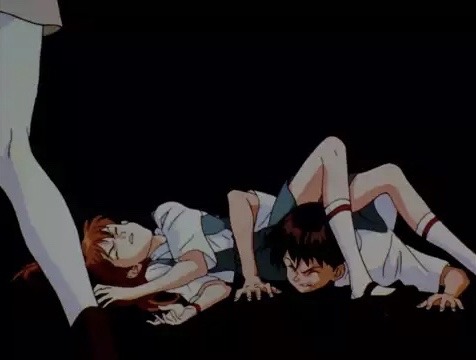

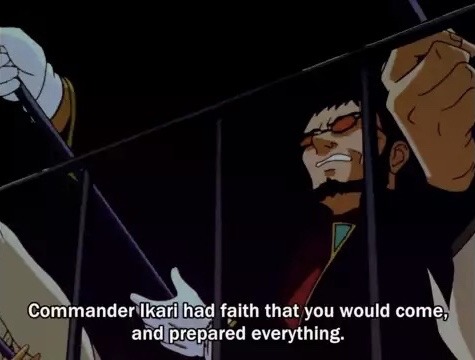
It’s actually pretty neat seeing the NERV staff being forced to prepare the Evangelions for launch manually and without electricity, unlocking all of the heavy machinery locks either by hand or with what limited power that the diesel generator provides them, as well as the fact that the pilots themselves have to use their EVA Units to push the walls locking them in place as well! It certainly creates a visually distinct and unique variation of the traditional EVA launch sequence! I love it!
Lol! The image of Units-00 through 02 crawling through the giant air vents with giant battery-packs on their backs just looks so silly! But still… again I love it
Shifting away from silly imagery though… Matarael oozing acid directly out of its eyeball to burn its way down into the GeoFront is simultaneously incredibly disgusting & disturbing, further emphasizing the EVA’s Angels as these eldritch alien monstrosities!
Alright! So Asuka’s actually demonstrating some legitimate leadership skills during the Angel fight of this episode! While this is still another veiled egotistical effort to prove her own “superiority” as part of her “masculine protest,” her strategy of having her Unit-02 act a living shield to protect Shinji & Rei’s respective units from Matarael’s acid as the two try to retrieve their dropped rifles at the bottom of the vertical shaft, with Shinji Unit-01 acting as an offense to whom Rei’s Unit-00 will serve as backup to by throwing the rifle up the shaft towards, thereby allowing the Shinji’s offensive EVA unit to fire a barrage of gunfire at the Angel above as the Asuka’s defensive EVA unit gets out of the way, destroying the Angel!
Like, this is actually some mature and calculated planning on Asuka’s part! A definite contrast to her previous immature boasting and lack of sense of direction while navigating NERV HQ during the rest of the episode. Asuka actually is capable of showing emotional maturity when the time is necessary!
Although from a motivation perspective, Asuka’s strategic planning is still rooted in her misguided sense of pride, since she not only immediately interjects Rei’s offer to serve as defense against Matarael’s acid by demanding to take her place, but tells Shinji that it’s her time to save him so that she doesn’t owe him any favors after he previously rescued her after the fight with Sandalphon in the previous episode!
Also, Rei being assigned the role of backup instead of offensive further illustrates that Asuka holds Rei in even lower regard than she does Shinji…
In addition to being such clever strategic planning on Asuka’s part, the actual execution of Asuka’s strategy is incredibly epic as well! I especially love the quick choreography of seeing the units drop down and prop themselves against the walls of the vent in rapid succession, with Asuka blocking Matarel’s acid, Rei using her Units booster jets to descend to the bottom of the pit, and Shinji firing a rapid volley of gunfire upwards which kills the Angel! Badass!

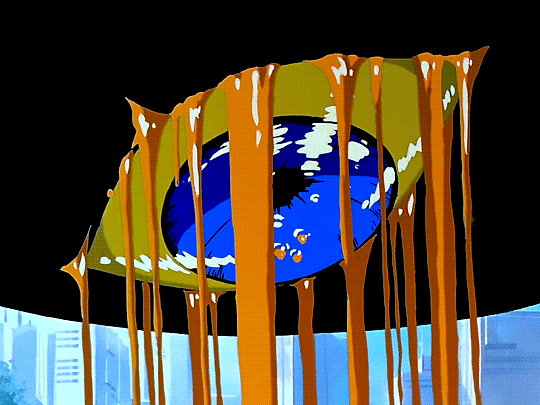

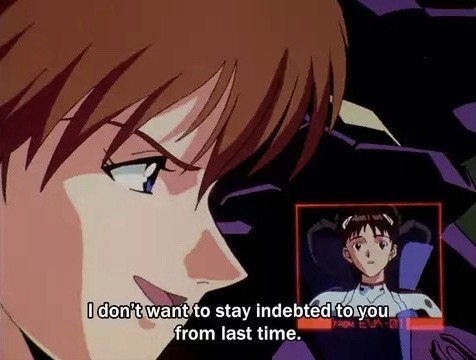
So… was Kaji actually looking up Misato’s dress like she speculated as she was up on his shoulders desperately trying to open the elevator roof while dying from a bursting bladder? Or was he just trying to look at her opening the door? Because if it’s the former, then that’s rather creepy on Kaji’s part…
Lol! If the Fuyutsuki with bare feet in a bucket of water scene is my favorite gag in this episode, then this right here is easily my second favorite! Just as Misato & Kaji are trying to open the elevator roof door, the power suddenly comes back on and the two lose their balance as the elevator starts to move again and reach its intended floor! Only for the door to open to reveal Ritsuko, Maya & Hyuga on the other side, and the three see sweaty and exhausted Misato & Kaji lying on top of each other in the floor! And given that Misato has her jacket off combined with her & Kaji’s exhaustion, sweat and unfortunate positioning, the three immediately assume the absolute worst, with Maya coldly commenting in response, “Sex fiends…”
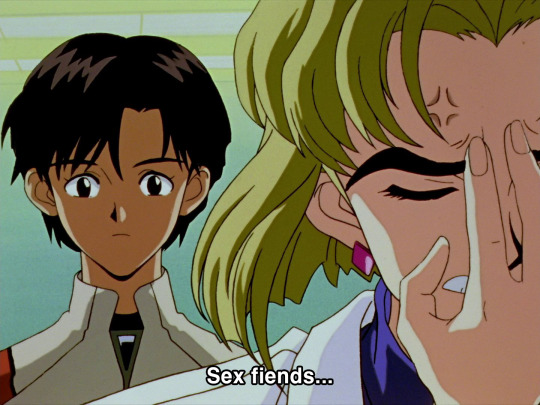
Absolutely priceless!
As gorgeous as this closing scene of Shinji, Asuka & Rei gazing up at the starry night as Toyko-3’s power comes back on is, it does raise some very interesting philosophical questions. While Shinji can’t help but appreciate the beauty of the night sky with he absence of light pollution, discovering the beauty which technology and electricity makes us forget, Asuka can’t help but state that she feels much safer and more comfortable with the artificial light that electricity provides, stating that it makes her feel closer to humans.
Not only does this harken back to the Hedgehog’s Dilemma in which people will pursue empty and hollow relationships out of fear of hurting each other, but it also argues that it is primarily due to humanity’s over reliance on technology that they are able to obtain the power that they possess. This is further reinforced by Rei’s comments about “Man [fearing] the darkness, and so he skirts away at the edges of it with fire,” which insinuates that technological advancement is derived from a desire for power, and that a desire for power is derived from fear of the dark, of the unknown.
It’s this desire for power & control, and fearing of the unknown & the other which is sadly the source of humanity’s sins and crimes throughout real-life, especially considering that the countries at the forefront of the Industrial Revolution were also the ones who perpetuated centuries upon centuries of colonialism, slavery, and genocide upon those that they othered and exploited for their technological advancements. It’s honestly a rather insightful critique about the correlation between over reliance on technological advancement and the adherence to fascistic authoritarianism which I alluded to at the start of the episode concerning Tokyo-3 utilizing the Magi supercomputer system to make all of the important political decisions in the place of an actual democratically elected government.
Also, the fact that Shinji then speculates over whether or not this “fear of the dark” and technological advancement is not only “what makes mankind a special species,” but also the reason that the Angels want to destroy them, implying that what makes humanity “special” it’s sins and flaws, and that the Angels are therefore passing divine judgement upon them. It also harkens back to Gendo’s previous words of “Mankind greatest enemy is man himself.” Some strong thematic writing on Anno’s part there!

And of course, the episode ends with Asuka demonstrating that despite her growth during the fight with Matarael, she still has a LLLOOONNNGGG way to go as she once again falling back on her old childish habits by dismissing Rei & Shinji’s philosophical questions with, “What are you? Stupid?! Who knows what [the Angels] think?”
So that was NGE, “Episode 11: In the Still Darkness/The Day Tokyo-3 Stood Still,” and overall it was another incredibly strong entry into the series! In addition to further emphasizing Asuka's flawed superiority complex through the lens of her "masculine protest" all throughout this episode, I especially loved the thematic and philosophical questions it raises about the dichotomy between technology, nature, humanity, & power, which is definitely a correlation with the kinds of elements found in the anime films directed by Anno's good friend Miyazaki. In that regard, it's actually kind of fitting that Studio Ghibli served as the guest-animators for this episode. Additionally this episode not only enhances the overall intrigue and ambiguity surrounding the shows mysteries through the unknown culprit behind the NERV and Tokyo-3 blackout, the fight with Matarael was another banger Angel fight, and this episode features some the absolute funniest moments in the entire series (special thanks to Fuyutsuki and Maya! Your comedic bits were most definitely appreciated)!
Next time it’s gonna be Episode 12!
#Evangelion: You Can (Not) Marathon#neon genesis evangelion#evangelion#nge#eva#hideaki anno#shinji ikari#asuka langley soryu#misato katsuragi#ryoji kaji#rei ayamani#ritsuko akagi#fuyutsuki#maya ibuki#makoto hyuga#shigeru aoba#peter pan#bill cipher#gravity falls#90s anime#anime and manga#studio ghibli#NERV#Matarael#gendo ikari
13 notes
·
View notes
Text
BOOKS & FILMS I FIRST READ/WATCHED IN 2022 THAT I RATED 4 OR MORE STARS
BOOKS
I Know Why the Caged Bird Sings (1969) by Maya Angelou
Ways of Seeing (1972) by John Berger
Blacksad (2006) by Juan Díaz Canales & Juanjo Guarnido
Saints and Strangers (1985) by Angela Carter
Discourse on Colonialism (1950) by Aimé Césaire
Stories of Your Life and Others (2002) by Ted Chiang
Are Prisons Obsolete? (2003) by Angela Y. Davis
Demons (1873) by Fyodor Dostoevsky
Absalom, Absalom! (1936) by William Faulkner
33 ⅓: J Dilla’s Donuts (2014) by Jordan Ferguson
Capitalist Realism: Is There No Alternative? (2009) by Mark Fisher
The Black Jacobins: Toussaint L’Ouverture and the San Domingo Revolution (1938) by C.L.R. James
The Broken Heart of America: St. Louis and the Violent History of the United States (2020) by Walter Johnson
Horror: A Very Short Introduction (2021) by Darryl Jones
Red Pill (2020) by Hari Kunzru
White Tears (2017) by Hari Kunzru
Bartleby, the Scrivener (1853) by Herman Melville
Selected Poems (1912 - 1950) by Edna St. Vincent Millay
Socialism: A Very Short Introduction (2005) by Michael Newman
The Sympathizer (2017) by Viet Thanh Nguyen
The God of Small Things (1997) by Arundhati Roy
Antony and Cleopatra by William Shakespeare (1606)
Macbeth by William Shakespeare (1606)
Timon of Athens by William Shakespeare (1605 - 1606)
Wild: From Lost to Found on the Pacific Crest Trail (2012) by Cheryl Strayed
The Little Stranger (2009) by Sarah Waters
The Cambridge Companion to American Gothic (2017) by Jeffrey Andrew Weinstock (ed.)
FILMS
It Happened One Night (1934) dir. Frank Capra
Bicycle Thieves (1948) dir. Vittorio De Sica
The Northman (2022) dir. Robert Eggers
Battleship Potemkin (1925) dir. Sergei Eisenstein
Smoke Signals (1998) dir. Chris Eyre
Let’s Scare Jessica to Death (1971) dir. John Hancock
Grizzly Man (2005) dir. Werner Herzog
The Texas Chain Saw Massacre (1974) dir. Tobe Hooper
Whisper of the Heart (1995) dir. Yoshifumi Kondō
First Blood (1982) dir. Ted Kotcheff
Dr. Strangelove (1964) dir. Stanley Kubrick
Eyes Wide Shut (1999) dir. Stanley Kubrick
M (1931) dir. Fritz Lang
Do The Right Thing (1989) dir. Spike Lee
The Green Knight (2021) dir. David Lowery
My Neighbor Totoro (1988) dir. Hayao Miyazaki
A Matter of Life and Death (1946) dir. Michael Powell & Emeric Pressburger
Pig (2021) dir. Michael Sarnoski
The Fall (2006) dir. Tarsem Singh
Prey (2022) dir. Dan Trachtenberg
Citizen Kane (1941) dir. Orson Welles
The Animatrix (2003) dir. various
#we made an effort to watch a lot of 'film school' type movies this year so that's why some of the films are so highbrow lol#books#movies
14 notes
·
View notes
Text
Top 100 Films
Just wanted to put this somewhere for the sake of documentation, might do this once a year to see how much the overall list changes.
Not ranked, but the list is done by release date, earliest to most recent. Includes short and feature length films (plus one TV series, and two serials, if you want to be specific):
• The Musketeers of Pig Alley (1912), dir. D.W. Griffith
• Fantômas (1913), dir. Louis Feuillade
• Les Vampires (1915), dir. Louis Feuillade
• The Doll (1919), dir. Ernst Lubitsch
• Foolish Wives (1922), dir. Erich von Stroheim
• Sherlock, Jr. (1924), dir. Buster Keaton
• Die Nibelungen: Kriemhild’s Revenge (1924), dir. Fritz Lang
• Greed (1924), dir. Erich von Stroheim
• The Last Laugh (1924), dir. F. W. Murnau
• The Gold Rush (1925), dir. Charlie Chaplin
• The General (1926), dir. Buster Keaton, Clyde Bruckman
• Sunrise: A Song of Two Humans (1927), dir. F. W. Murnau
• The Passion of Joan of Arc (1928), dir. Carl Theodor Dreyer
• The Docks of New York (1928), dir. Josef von Sternberg
• The Wedding March (1928), dir. Erich von Stroheim
• Man with a Movie Camera (1929), Dziga Vertov
• M (1931), dir. Fritz Lang
• Vampyr (1932), dir. Carl Theodor Dreyer
• I Am a Fugitive from a Chain Gang (1932), dir. Mervyn LeRoy
• Gold Diggers of 1933 (1933), dir. Mervyn LeRoy, Bubsy Berkeley
• L’Atalante (1934), dir. Jean Vigo
• The Scarlet Empress (1934), dir. Josef von Sternberg
• The Thin Man (1934), dir. W.S. Van Dyke
• The Only Son (1936), dir. Yasujirō Ozu
• Citizen Kane (1941), dir. Orson Welles
• Now, Voyager (1942), dir. Irving Rapper
• Meshes of the Afternoon (1943), dir. Maya Deren
• Day of Wrath (1943), dir. Carl Theodor Dreyer
• At Land (1944), dir. Maya Deren
• Ivan the Terrible, Part I (1944), dir. Sergei Eisenstein
• Notorious (1946), dir. Alfred Hitchcock
• Sunset Boulevard (1950), dir. Billy Wilder
• Monsieur Hulot’s Holiday (1953), dir. Jacques Tati
• The Wages of Fear (1953), dir. Henri-Georges Clouzot
• The Big Heat (1953), dir. Fritz Lang
• The Inauguration of the Pleasure Dome (1954), dir. Kenneth Anger
• Rear Window (1954), dir. Alfred Hitchcock
• Ordet (1955), dir. Carl Theodor Dreyer
• A Man Escaped (1956), dir. Robert Bresson
• Ivan the Terrible, Part II: The Boyars’ Plot (1958), dir. Sergei Eisenstein
• La Dolce Vita (1960), dir. Federico Fellini
• L’Avventura (1960), dir. Michelangelo Antonioni
• La Notte (1961), dir. Michelangelo Antonioni
• L’Eclisse (1962), dir. Michelangelo Antonioni
• The Exterminating Angel (1962), dir. Luis Buñuel
• Mothlight (1963), dir. Stan Brakhage
• Red Desert (1964), dir. Michelangelo Antonioni
• Gertrud (1964), dir. Carl Theodor Dreyer
• The War Game (1966), dir. Peter Watkins
• Au Hasard Balthazar (1966), dir. Robert Bresson
• Daisies (1966), dir. Věra Chytilová
• Lemon (1969), dir. Hollis Frampton
• The Conformist (1970), dir. Bernardo Bertolucci
• The Discreet Charm of the Bourgeoisie (1972), dir. Luis Buñuel
• F for Fake (1973), dir. Orson Welles
• Lancelot of the Lake (1974), dir. Robert Bresson
• A Woman Under the Influence (1974), dir. John Cassavetes
• The Texas Chain Saw Massacre (1974). dir. Tobe Hooper
• House (1977), dir. Nobuhiko Obayashi
• Stalker (1979), dir. Andrei Tarkovsky
• Nostalgia (1983), dir. Andrei Tarkovsky
• L’Argent (1983), dir. Robert Bresson
• Blue Velvet (1986), dir. David Lynch
• Heathers (1989), dir. Michael Lehmann
• Kiki’s Delivery Service (1989), dir. Hayao Miyazaki
• Baraka (1992), dir. Ron Fricke
• Satantango (1994), dir. Béla Tarr
• A Confucian Confusion (1994), dir. Edward Yang
• Chungking Express (1994), dir. Wong Kar-Wai
• Ed Wood (1994), dir. Tim Burton
• Whisper of the Heart (1995), dir. Yoshifumi Kondo
• Showgirls (1995), dir. Paul Verhoeven
• Neon Genesis Evangelion: The End of Evangelion (1997), dir. Hideaki Anno, Kazuya Tsurumaki
• Gummo (1997), dir. Harmony Korine
• The Big Lebowski (1998), dir. Joel Coen, Ethan Coen
• Outer Space (1999), dir. Peter Tscherkassky
• Beau Travail (1999), dir. Claire Denis
• Julien Donkey-Boy (1999), dir. Harmony Korine
• Yi Yi (2000), dir. Edward Yang
• Dancer in the Dark (2000), dir. Lars von Trier
• The Piano Teacher (2001), dir. Michael Haneke
• Mulholland Drive (2001), dir. David Lynch
• What Time Is It There? (2001), dir. Tsai Ming-liang
• Memories of Murder (2003), dir. Bong Joon-ho
• The Matrix Reloaded (2003), dir. Lily Wachowski, Lana Wachowski
• The Village (2004), dir. M. Night Shyamalan
• Caché (2005), dir. Michael Haneke
• Southland Tales (2006), dir. Richard Kelly
• Inland Empire (2006), dir. David Lynch
• Zodiac (2007), dir. David Fincher
• The White Ribbon (2009), dir. Michael Haneke
• The Turin Horse (2011), dir. Béla Tarr
• Five Broken Cameras (2012), dir. Emad Burnat, Guy Davidi
• The Master (2012), dir. Paul Thomas Anderson
• Spring Breakers (2012), dir. Harmony Korine
• Song to Song (2017), dir. Terrence Malick
• Twin Peaks: The Return (2017), dir. David Lynch
• The Favourite (2018), dir. Yorgos Lanthimos
• Portrait of a Lady on Fire (2019), dir. Céline Sciamma
• We’re All Going to the World’s Fair (2021), dir. Jane Schoenbrun
(10/4/23)
17 notes
·
View notes
Text
an absolute list of films i’d like to watch (so far)
thanks to the Letterboxd community for always recommending the most unhinged pieces ever
Gummo, Harmony Korine (1997)
Hard Candy, David Slade (2005)
House, Nobuhiko Obayashi (1977)
Ichi the Killer, Takashi Miike (2001)
Kids, Larry Clark (1995)
Léon: The Professional, Luc Besson (1994)
Oldboy, Park Chan-wook (2003)
Once Upon a Time in America, Sergio Leone, (1984)
Fantastic Planet, René Laloux (1973)
Punch Drunk-Love, Paul Thomas Anderson (2002)
[REC], Jaume Balagueró & Paco Plaza (2007)
The Rocky Horror Picture Show, Jim Sharman (1975)
Shock Treatment, Jim Sharman (1981)
Sleepaway Camp, Robert Hiltzik (1983)
The Warriors, Walter Hill (1979)
Videodrome, David Cronenberg (1983)
Taxi Driver, Martin Scorsese (1976)
The Ninth Configuration, William Peter Blatty (1980)
Flowers for Algernon, Jeff Bleckner (2000)
Mona Lisa, Neil Jordan (1986)
The Machinist, Brad Anderson (2004)
Miller’s Crossing, Joel Coen (1990)
Apocalypse Now, Francis Ford Coppola (1979)
The Farewell, Lulu Wang (2019)
Trash Humpers, Harmony Korine (2009)
Pixote, Héctor Babenco (1980)
Julien Donkey-Boy, Harmony Korine (1999)
Last Night, Don McKellar (1998)
Duck Butter, Miguel Arteta (2018)
Stalker, Andrei Tarkovsky (1979)
The Pianist, Roman Polanski (2002)
Reservoir Dogs, Quentin Tarantino (1992)
Blue Velvet, David Lynch (1986)
At Eternity’s Gate, Julian Schnabel (2018)
Birdman, Alejandro González Iñárritu (2014)
Climax, Gaspar Noé (2018)
Shirkers, Sandi Tan (2018)
A Ghost Story, David Lowery (2017)
Carol, Todd Haynes (2015)
Lupin the Third: The Castle of Cagliostro, Hayao Miyazaki (1979)
Baby Driver, Edgar Wright (2017)
The Revenant, Alejandro González Iñárritu (2015)
She’s Gotta Have It, Spike Lee (1986)
I Don’t Feel at Home in This World Anymore, Macon Blair (2017)
It Comes at Night, Trey Edward Shults (2017)
Buster’s Mal Heart, Sarah Adina Smith (2016)
Cam, Daniel Goldhaber (2018)
Struggle: The Life and Lost Art of Szukalski, Irek Dobrowolski (2018)
I Think We’re Alone Now, Reed Morano (2018)
Skins, Eduardo Casanova (2017)
The Fundamentals of Caring, Rob Burnett (2016)
About Time, Richard Curtis (2013)
The Bad Batch, Ana Lily Amirpour (2016)
The Highwaymen, John Lee Hancock (2019)
Three Billboards Outside Ebbing, Missouri, Martin McDonagh (2017)
Natural Born Killers, Oliver Stone (1994)
XX, Karyn Kusama & Jovanka Vuckovic & Roxanne Benjamin & St. Vincent (2017)
Cargo, Ben Howling & Yolanda Ramke (2017)
Residue, Alex Garcia Lopez (2015)
Joan Didion: The Center Will Not Hold, Griffin Dunne (2017)
Joshua: Teenager vs. Superpower, Joe Piscatella (2017)
Chasing Trane, John Scheinfeld (2016)
Tallulah, Siân Heder (2016)
Expedition Happiness, Felix Starck & Selima Taibi (2017)
Bottom of the World, Richard Sears (2017)
Super Dark Times, Kevin Phillips (2017)
Notes on Blindness, Pete Middleton & James Spinney (2016)
Newness, Drake Doremus (2017)
ReMastered: The Two Killings of Sam Cooke, Kelly Duane de la Vega (2019)
Paddleton, Alexandre Lehmann (2019)
Juanita, Clark Johnson (2019)
Temple, Michael Barrett (2017)
Maya Angelou: And Still I Rise, Bob Hercules & Rita Coburn Whack (2016)
P, Paul Spurrier (2005)
I Am Happiness on Earth, Julián Hernández (2014)
Carrie Pilby, Susan Johnson (2016)
Belief: The Possession of Janet Moses, David Stubbs (2015)
I Called Him Morgan, Kasper Collin (2016)
A Family Affair, Tom Fassaert (2015)
Q, Sanjeev Gupta (2017)
Boyhood, Richard Linklater (2014)
Thelma & Louise, Ridley Scott (1991)
Brick, Rian Johnson (2005)
The Royal Tenenbaums, Wes Anderson (2001)
Moonlight, Barry Jenkins (2016)
Mulholland Drive, David Lynch (2001)
Solaris, Andrei Tarkovsky (1972)
Lake Mungo, Joel Anderson (2008)
War of the Worlds, Steven Spielberg (2005)
Tetsuo: The Iron Man, Shinya Tsukamoto (1989)
Mady, Panos Cosmatos (2018)
Raw, Julia Ducournau (2016)
The Neon Demon, Nicolas Winding Refn (2016)
The Love Witch, Anna Biller (2016)
Tusk, Kevin Smith (2014)
Black Swan, Darren Aronofsky (2010)
A Serbian Film, Srđan Spasojević (2010)
Antichrist, Lars von Trier (2009)
Paprika, Satoshi Kon (2006)
Audition, Takashi Miike (1999)
Fear and Loathing in Las Vegas, Terry Gilliam (1998)
Perfect Blue, Satoshi Kon (1997)
Suspiria, Dario Argento (1977)
Salò, or the 120 Days of Sodom, Pier Paolo Pasolini (1975)
Irreversible, Gaspar Noé (2002)
Teeth, Mitchell Lichtenstein (2007)
Guinea Pig 2: Flower of Flesh and Blood, Hideshi Hino (1985)
I Stand Alone, Gaspar Noé (1998)
Begotten, E. Elias Merhige (1989)
Dekalog, Krzysztof Kieślowski (1989)
Dancer in the Dark, Lars von Trier (2000)
Shoplifters, Hirokazu Kore-eda (2018)
Honey Boy, Alma Har’el (2019)
The Inner Scar, Philippe Garrel (1972)
The Handmaiden, Park Chan-wook (2016)
Funny Games, Michael Haneke (1997)
$9.99, Tatia Rosenthal (2008)
A Girl Walks Home Alone at Night, Ana Lily Amirpour (2014)
In The Mood for Love, Wong Kar-wai (2000)
Stranger Than Paradise, Jim Jarmusch (1984)
Quadrophenia, Franc Roddam (1979)
Blow-Up, Michaelangelo Antonioni (1966)
Do the Right Thing, Spike Lee (1989)
Christiane F., Uli Edel (1981)
Grey Gardens, Albert Maysles & David Maysles & Muffie Meyer & Ellen Hovde (1975)
The Tribe, Myroslav Slaboshpytskyi (2014)
Uncut Gems, Josh Safdie & Benny Safdie (2019)
Persona, Ingmar Bergman (1966)
Wild Strawberries, Ingmar Bergman (1957)
The Silence, Ingmar Bergman (1963)
Portrait of a Lady on Fire, Céline Sciamma (2019)
The Lighthouse, Robert Eggers (2019)
Promising Young Woman, Emerald Fennell (2020)
The Human Condition III: A Soldier’s Prayer, Masaki Kobayashi (1961)
As I Was Moving Ahead Occasionally I Saw Brief Glimpses of Beauty, Jonas Mekas (2000)
X, Ti West (2022)
Everything Everywhere All at Once, Daniel Scheinert & Daniel Kwan (2022)
The Unbearable Weight of Massive Talent, Tom Gormican (2022)
The Conversation, Francis Ford Coppola (1974)
Sufjan Stevens: Carrie & Lowell Live, Aaron Craig & Alex Craig (2017)
La Haine, Mathieu Kassovitz (1995)
My Life as a Zucchini, Claude Barras (2016)
The Wolf House, Cristóbal León & Joaquín Cociña (2018)
Come and See, Elem Klimov (1985)
Noisy Requiem, Yoshihiko Matsui (1988)
Eyes Without a Face, Georges Franju (1960)
Angel’s Egg, Mamoru Oshii (1985)
Dogville, Lars von Trier (2003)
Pink Flamingos, John Waters (1972)
Are you lost in the world like me?, Steve Cutts (2016)
42 notes
·
View notes
Text
dvd collection #-i
9 dir. Shane Acker
12 Monkeys dir. Terry Gilliam
Aftermath Genesis dir. Nacho Cerda
All That Jazz dir. Bob Fosse
Altered States dir. Ken Russell
Amour dir. Michael Haneke
Angst dir. Gerald Kargl
Annie Hall dir. Woody Allen
Another Public Enemy dir. Kang Woo-Suk
Antiviral dir. Brandon Cronenberg
Audition dir. Takashi Miike
Battle Royale dir. Kinji Fukasaku
Before Sunrise dir. Richard Linklater
Before Sunset dir. Richard Linklater
Begotten dir. E. Elias Merhige
Bill Osco's Alice in Wonderland dir. Bud Townsend
Black Swan dir. Darren Aranofsky
Blood and Black Lace dir. Mario Bava
Blue Valentine dir. Derek Cianfrance
Blue Velvet dir. David Lynch
Bottle Rocket dir. Wes Anderson
Bruno dir. Larry Charles
Bubba Ho-Tep dir. Don Coscarelli
Bully dir. Larry Clark
The Burning Moon dir. Olaf Ittenbach
Cabin Fever dir. Eli Roth
Cache dir. Michael Haneke
Calvaire dir. Fabrice du Welz
Cannibal Ferox dir. Umberto Lenzi
Cannibal Holocaust dir. Ruggero Deodato
Casablanca dir. Michael Curtiz
Castle in the Sky dir. Hayao Miyazaki
Cigarette Burns dir. John Carpenter
The Conjuring dir. James Wan
Coraline dir. Henry Selick
Corpse Bride dir. Tim Burton
Crimson Peak dir. Guillermo del Toro
Cure dir. Kiyoshi Kurosawa
Delta Farce dir. CB Harding
The Dentist dir. Brian Yuzna
The Devil's Backbone dir. Guillermo del Toro
Dogville dir. Lars Von Trier
Double Indemnity dir. Billy Wilder
The Dreamers dir. Bernardo Bertolucci
Drive dir. Nicolas Winding Refn
Dune dir. David Lynch
Eternal Sunshine of the Spotless Mind dir. Michel Gondry
The Evil Dead (1982) dir. Sam Raimi
The Evil Dead (2013) dir. Fede Alvarez
Experimental FIlms dir. Maya Deren
Fando y Lis dir. Alejandro Jodorowsky
Fantastic Mr. Fox dir. Wes Anderson
Flowers dir. Phil Stevens
The Fountain dir. Darren Aranofsky
Freddy Got Fingered dir. Tom Green
The French Dispatch dir. Wes Anderson
Frontier(s) dir. Xavier Gens
Funny Games (2007) dir. Michael Haneki
Girl, Interrupted dir. James Mangold
Goodnight Mommy dir. Veronika Franz & Severin Fiala
The Grand Budapest Hotel dir. Wes Anderson
The Great Muppet Caper dir. Jim Henson
Guinea Pig: Flower of Flesh and Blood dir. Hideshi Hino
Gummo dir. Harmony Korine
Half Baked dir. Tamra Davis
Happiness of the Katakuris dir. Takashi Miike
Hara-Kiri dir. Takashi Miike
Hard Boiled dir. John Woo
Hard Candy dir. David Slade
Heathers dir. Michael Lehmann
Hellraiser dir. Clive Barker
Henry: Portrait of a Serial Killer dir. John McNaughton
Her dir. Spike Jonze
A History of Violence dir. David Cronenberg
The Holy Mountain dir. Alejandro Jodorowsky
The Host dir. Bong Joon-Ho
The Hunt dir. Thomas Vinterberg
Ichi the Killer dir. Takashi Miike
The Imaginarium of Doctor Parnassus dir. Terry Gilliam
Imprint dir. Takashi Miike
In a Glass Cage dir. Agustin Villaronga
Inland Empire dir. David Lynch
Inside dir. Verane Frediani & Franck Ribiere
I Saw the Devil dir. Kim Jee-Woon
I Spit on Your Grave dir. Meir Zarchi
Isle of Dogs dir. Wes Anderson
9 notes
·
View notes
Text
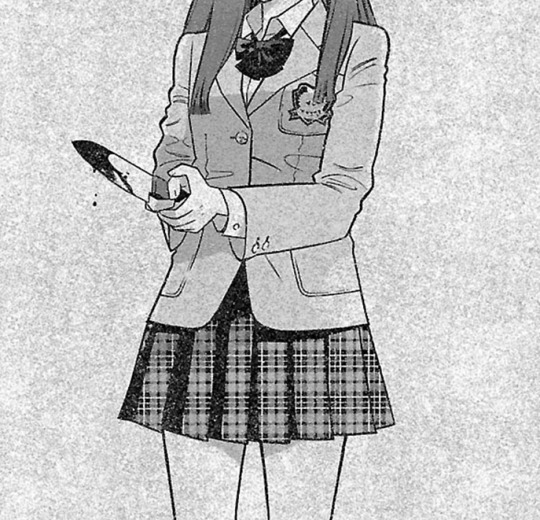
224 notes
·
View notes
Text
Maya Miyazaki's Encyclopedia Erotica plus Lecherous Lessons (宮崎摩耶大図鑑) - Blu-ray
Maya Miyazaki's Encyclopedia Erotica plus Lecherous Lessons (宮崎摩耶大図鑑) - Blu-ray
スタジオ: キティー メディア
更新日: 2023/04/11
時間: 62分
女優: anime
A two-episode treasure trove of three tales that explore the sexier aspects of time travel, cycling and academia! The Legend of Ooedo's 800 Holes begins when Takehiko falls into a manhole and time travels backwards to feudal Japan! After wandering without food or water for a few days, he gets entang
DVD・DVD販売サイト DVD360
DVD・DVD販売サイト DVD360は年中無休、24時間営業でDVDをオンラインで販売しています。20000タイトルの中からお好きなDVDをお選びください!郵送でよくある【DVDを開けられた】や【明細にDVDと記載された】などの心配が一切ありません。安心してご購入いただけます。
0 notes
Text
Maya Miyazaki's Encyclopedia Erotica plus Lecherous Lessons (宮崎摩耶大図鑑) - (DVD-Rディスク盤)
Maya Miyazaki's Encyclopedia Erotica plus Lecherous Lessons (宮崎摩耶大図鑑) - (DVD-Rディスク盤)
スタジオ: キティー メディア
更新日: 2023/04/11
時間: 62分
女優: anime
A two-episode treasure trove of three tales that explore the sexier aspects of time travel, cycling and academia! The Legend of Ooedo's 800 Holes begins when Takehiko falls into a manhole and time travels backwards to feudal Japan! After wandering without food or water for a few days, he gets entang
DVD・DVD販売のDVDハッピー
DVD・DVD販売のDVDハッピーは、DVDを大量に扱っています。一律$1.95 懐かしいDVDから最新のものまで豊富な品揃えで販売しています。
0 notes
Photo

Celebrities
Week Ending September 5th, 2022
Joseph Quinn +3
Neil Gaiman
Timothée Chalamet
Tom Sturridge +2
Harry Styles
Joe Keery +2
Jensen Ackles -6
Leonardo Dicaprio
Jordan Peele +4
Grace Van Dien
Maya Hawke
Pedro Pascal -7
Matt Smith -6
Jamie Campbell Bower +3
Rhys Darby
Chris Evans -5
Alex Hirsch -1
Keke Palmer
Hayao Miyazaki
Misha Collins -10
The number in italics indicates how many spots a name moved up or down from the previous week. Bolded names weren’t on the list last week.

65 notes
·
View notes
Text
Maya Miyazaki's Encyclopedia Erotica plus Lecherous Lessons (宮崎摩耶大図鑑) - (DVD-Rディスク盤)
Maya Miyazaki's Encyclopedia Erotica plus Lecherous Lessons (宮崎摩耶大図鑑) - (DVD-Rディスク盤)
スタジオ: キティー メディア
更新日: 2023/04/11
時間: 62分
女優: anime
A two-episode treasure trove of three tales that explore the sexier aspects of time travel, cycling and academia! The Legend of Ooedo's 800 Holes begins when Takehiko falls into a manhole and time travels backwards to feudal Japan! After wandering without food or water for a few days, he gets entang
DVD・DVD販売サイト【DVD村】
DVD正規販売のDVD村です。動画ダウンロード$1.49!サンプル動画あり、ブルーレイ、DVDあり。
0 notes
Text
Maya Miyazaki's Encyclopedia Erotica plus Lecherous Lessons (宮崎摩耶大図鑑) - (DVD-Rディスク盤)
Maya Miyazaki's Encyclopedia Erotica plus Lecherous Lessons (宮崎摩耶大図鑑) - (DVD-Rディスク盤)
スタジオ: キティー メディア
更新日: 2023/04/11
時間: 62分
女優: anime
A two-episode treasure trove of three tales that explore the sexier aspects of time travel, cycling and academia! The Legend of Ooedo's 800 Holes begins when Takehiko falls into a manhole and time travels backwards to feudal Japan! After wandering without food or water for a few days, he gets entang
DVD・DVD販売サイト DVD360
DVD・DVD販売サイト DVD360は年中無休、24時間営業でDVDをオンラインで販売しています。20000タイトルの中からお好きなDVDをお選びください!郵送でよくある【DVDを開けられた】や【明細にDVDと記載された】などの心配が一切ありません。安心してご購入いただけます。
0 notes
Text
Maya Miyazaki's Encyclopedia Erotica plus Lecherous Lessons (宮崎摩耶大図鑑) - Blu-ray
Maya Miyazaki's Encyclopedia Erotica plus Lecherous Lessons (宮崎摩耶大図鑑) - Blu-ray
スタジオ: キティー メディア
更新日: 2023/04/11
時間: 62分
女優: anime
A two-episode treasure trove of three tales that explore the sexier aspects of time travel, cycling and academia! The Legend of Ooedo's 800 Holes begins when Takehiko falls into a manhole and time travels backwards to feudal Japan! After wandering without food or water for a few days, he gets entang
DVD・DVD販売サイト DVDカン
DVD・DVD販売サイト DVDカンは若年層と年配層のAVファンたちのニーズに答え、単価の安い$1.79よりのPPV用作品と単価の高い$20ぐらいするDVD正規版作品で両方をご提供いたします。10万タイトル以上のDVD作品を揃え、更に洋画も充実で、幅広いジャンルでお楽しみいただけます。
0 notes